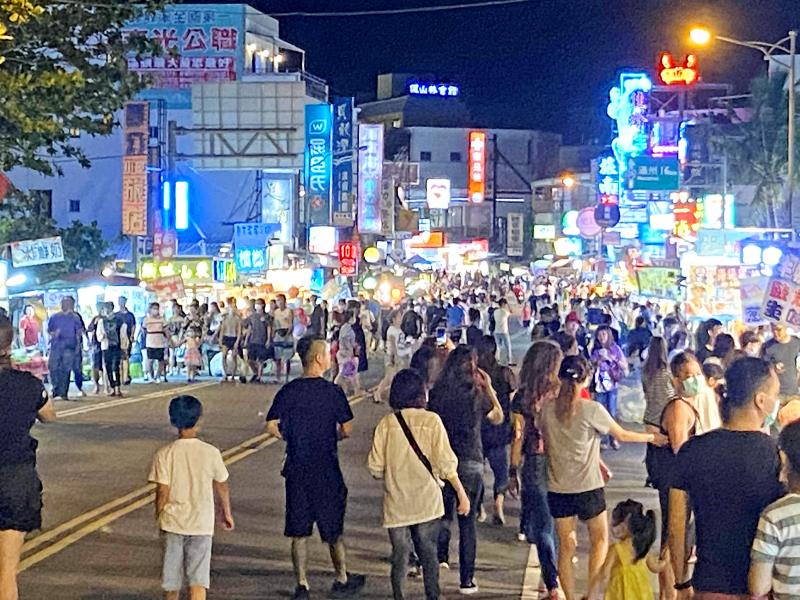Restaurants, shops and hotels in Pingtung County’s Kenting (墾丁) have seen tourists returning and are looking at stronger business prospects as the summer vacation draws nearer.
The seaside town on the nation’s southernmost point remains a popular tourist attraction, despite the COVID-19 pandemic, thanks to its white-sand beaches, open fields and abundant sunlight. However, it has yet to emerge from price gouging complaints a few years back.
Hai Chuan Seafood Restaurant (海饌餐廳) on Kenting Street Night Market saw its capacity hit 50 percent on weekdays and 80 percent on weekends for the past month, a significant improvement from March and April when only a few people visited the area and all wore masks, Ho Yu-yao (何宇堯), a server at the eatery, told the Taipei Times last week.

Photo: Tsai Tsung-hsien, Taipei Times
Visitors are no longer wearing masks this month — a sign that people feel more comfortable going out after infections dropped to zero for weeks, he said.
Ho, 33, sold small souvenirs for years before working at the restaurant because of the virus shock.
Business is likely to gain more traction next month, when schools close for the summer vacation — a high season for Kenting, Ho said.
A 32-year-old proprietor of a shop selling beach clothing and sandals on Kenting Street said the area has almost recovered to pre-pandemic levels on weekends — judging by the size of the crowds.
Having run the shop for eight years, the owner, surnamed Chang (張), said that price gouging complaints hurt her business more than the novel coronavirus.
There are no confirmed cases in the sparsely populated peninsula, where people are generally laid-back, enjoy outdoor activities and are not particularly worried about the contagion, she said.
Monica Chang (張孟雯), a manager at Caesar Park Kenting (墾丁凱撒飯店), agreed.
Occupancy rates at the resort hotel near Kenting National Park (墾丁國家公園) have approached 90 percent during weekdays and 95 percent on weekends this month, up from 40 to 50 percent at the height of the virus outbreak, Chang said.
Room rates averaged NT$3,500 (US$117.57) in recent months, compared with NT$4,000 last year, she said, adding that she hoped rates would rise to NT$6,500 next month and beyond, now that people have regained confidence and stimulus measures would soon be implemented.
However, business has yet to pick up for transportation service providers, which rely more on international tourists.
Tseng Ting-kuan (曾庭冠), who runs motorcycle and vehicle rentals, said his company and peers are still struggling because domestic travelers drive their own cars and have no need of their services.
Taiwan’s COVID-19 situation is relatively stable, but the government, while encouraging domestic trips, has no intention of opening up the borders anytime soon as confirmed cases continue to spike in many parts of the world.

In Italy’s storied gold-making hubs, jewelers are reworking their designs to trim gold content as they race to blunt the effect of record prices and appeal to shoppers watching their budgets. Gold prices hit a record high on Thursday, surging near US$5,600 an ounce, more than double a year ago as geopolitical concerns and jitters over trade pushed investors toward the safe-haven asset. The rally is putting undue pressure on small artisans as they face mounting demands from customers, including international brands, to produce cheaper items, from signature pieces to wedding rings, according to interviews with four independent jewelers in Italy’s main

Japanese Prime Minister Sanae Takaichi has talked up the benefits of a weaker yen in a campaign speech, adopting a tone at odds with her finance ministry, which has refused to rule out any options to counter excessive foreign exchange volatility. Takaichi later softened her stance, saying she did not have a preference for the yen’s direction. “People say the weak yen is bad right now, but for export industries, it’s a major opportunity,” Takaichi said on Saturday at a rally for Liberal Democratic Party candidate Daishiro Yamagiwa in Kanagawa Prefecture ahead of a snap election on Sunday. “Whether it’s selling food or

CONCERNS: Tech companies investing in AI businesses that purchase their products have raised questions among investors that they are artificially propping up demand Nvidia Corp chief executive officer Jensen Huang (黃仁勳) on Saturday said that the company would be participating in OpenAI’s latest funding round, describing it as potentially “the largest investment we’ve ever made.” “We will invest a great deal of money,” Huang told reporters while visiting Taipei. “I believe in OpenAI. The work that they do is incredible. They’re one of the most consequential companies of our time.” Huang did not say exactly how much Nvidia might contribute, but described the investment as “huge.” “Let Sam announce how much he’s going to raise — it’s for him to decide,” Huang said, referring to OpenAI

The global server market is expected to grow 12.8 percent annually this year, with artificial intelligence (AI) servers projected to account for 16.5 percent, driven by continued investment in AI infrastructure by major cloud service providers (CSPs), market researcher TrendForce Corp (集邦科技) said yesterday. Global AI server shipments this year are expected to increase 28 percent year-on-year to more than 2.7 million units, driven by sustained demand from CSPs and government sovereign cloud projects, TrendForce analyst Frank Kung (龔明德) told the Taipei Times. Demand for GPU-based AI servers, including Nvidia Corp’s GB and Vera Rubin rack systems, is expected to remain high,